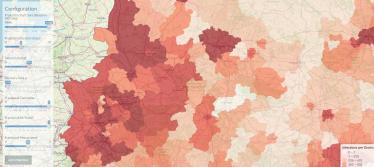EPIPREDICT: User-oriented Extension and Automation of Agent-based Software for Pathogen-specific Modelling of Epidemics

Due to our globalized and ever-more connected world, infectious diseases spread wider and faster than ever before. Especially in wake of the 2020 Sars-Cov-2 pandemic, it becomes clear that such diseases can rise from very few cases to a global thread within days. While there are numerous epidemiological prediction models, most of them follow a macroscopic approach to approximate overall infections or case fatalities. However, a more profound understanding of how the spread is impacted by biological (age, sex, immunization, …) , social (relationships, working hours, individual response to infection, …) and public/political factors (public fear, infection prevention policies, …) can help to craft more sophisticated epidemics response mechanisms. To this end microsimulations are used to get a deeper understanding of drivers of the epidemic, to predict possible future states and to enhance decision making.
Since 2014, an agent-based infectious disease modeling platform was developed at the University of Münster in a joint project of information system developers, epidemiologists and virologists. With a strong focus on applicability, the software’s usability, as perceived by non-IT domain experts, has always been a key requirement. Hence, we could derive the following core features:
- A web-based and code-free modeling environment that can serve medical domain experts and decision-makers as a testbed to investigate infection scenarios and evaluate mitigation strategies
- A modular software architecture that facilitates reusability and extensibility for developers
- Rich simulation visualization tools to enhance and accelerate data analysis
- A platform to work collaboratively by documenting and storing test runs and results in an extensive database
As of March 1st, a new cross-sectional project, EPIPREDICT, funded by the Nationale Forschungsplattform für Zoonosen was initiated. This project aims at extending the modeling platform to enable the analysis of various zoonotic disease infection scenarios. These diseases originate from non-human animals and are in many cases extremely dangerous to humans as our immune system is generally not sufficiently prepared to respond to disease exposue. Bird-Flu, Swine-Flu, HIV, Ebola, Malaria, Hanta-Virus and the recent Sars-Cov-2 belong to this family of diseases. However, the individual dynamic of such diseases and the consequential model complexity varies significantly. Therefore, three major project areas with increasing complexity and respective real-world use cases were defined:
- Zoonotic pathogens in human populations
use cases: influenza viruses and vaccination coverage & introduction of corona viruses from endemic regions - Unidirectional transmission from animals to humans
use case: transmission of hanta viruses from bank voles to humans - Bidirectional transmission (animal – human – animal)
use case: bidirectional transmission of malaria tropica pathogens between mosquito populations and human populations
These models are created in close collaboration with our domain-expert project partners from the Institute of Molecular Virology, University of Münster; Department of Clinical Epidemiology, University of Münster; Julius Kühn-Institut, Münster; Charité, Berlin; Niedersächsisches Landesgesundheitsamt, Hannover and Friedrich-Loeffler-Institut, Greifswald - Insel Riems.

